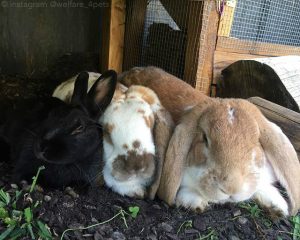Why not just one rabbit?
Same species social interaction is very important for the health and well-being of rabbits. In nature, wild rabbits coexist in large groups. Therefore replicating this, as much as practicle and possible, is the most appropriate way of keeping rabbits. In nature rabbits are dependant on the group. There are many reasons why they need this.

In a group, rabbits alert each other from predators. The group provides a comforting factor to the rabbits. At a time, some members in the group may be in a calm, relaxed state, and others may be alert, vigilant for predators. Rabbits in the group can rely on other rabbits to alert them of a predator if necessesary. If no such group exists, a solitary rabbit is in a perpetual state of alertness, unable to feel calm or relaxed.
In both wild and domestic rabbits, it can be seen that they have regular body contact with one another. They will sleep, play, clean, eat and relax next to one another. The group provides the safe and supportive environment that enables rabbits to exhibit these appropriate behaviours.
Rabbits that have been kept alone are seen to become very dependant to the owner. They are seen to become very apathetic caused by intense loneliness. No human is able to replace another rabbit. Humans are unable to replicate the same body language as a rabbit. It has been found that rabbits which are kept in groups, with an appropriate amount of space, live longer, are more happy, less shy and are less often sick with disease.
Back to Common Questions
